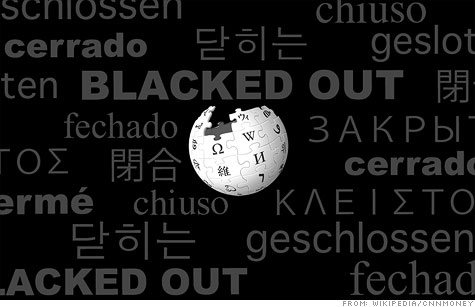
NEW YORK (CNNMoney) -- A handful of large websites will go dark on Wednesday to protest an anti-piracy bill that critics say will wreck the Internet as we know it.
Wikipedia, user-submitted news site Reddit, the blog Boing Boing and the Cheezburger network of comedy sites all plan to participate in the blackout. The protest is their response to the Stop Online Piracy Act (SOPA) bill, a piece of proposed legislation that is working its way through Congress.
Introduced in the House of Representatives in late October, the bill aims to crack down on copyright infringement by restricting access to sites that fuel it. Its targets include "rogue" overseas sites like torrent hub The Pirate Bay, which essentially operates as a trading ground for illegal downloads of movies and other digital content.
A similar bill called the Protect IP Act was approved by a Senate committee in May and is now pending before the full Senate.
The controversial legislation has turned into an all-out war between Hollywood and Silicon Valley. Media companies have united in favor of it, while tech's power players are throwing their might into opposing it.
If SOPA passes, copyright holders would be able to complain to law enforcement officials and get websites shut down. Search engines and other providers would have to block rogue sites when ordered to do so by a judge. Sites could be punished for hosting pirated content in the first place -- and Internet companies are worried that they could be held liable for users' actions.
As BoingBoing wrote: "Making one link would require checking millions (even tens of millions) of pages, just to be sure that we weren't in some way impinging on the ability of five Hollywood studios, four multinational record labels, and six global publishers to maximize their profits."
White House jumps in: The House Committee on Oversight and Government Reform was supposed to hold a hearing with industry experts on Wednesday, which is why sites targeted that day for a blackout.
But Rep. Darrell Issa, a Republican from California who opposes SOPA, postponed the hearing on Friday after House Majority Leader Eric Cantor said the bill won't move in its current form.
Cantor's comments sparked some news reports claiming that SOPA is dead, but an aide in Issa's office said "that's probably a little premature."
Reddit founder Alexis Ohanian was slated to testify in Washington, but he said he will now instead attend a protest rally in New York City organized by the group NY Tech Meetup. They plan to assemble outside the offices of New York senators Chuck Schumer and Kirsten Gillibrand.
The White House released its first statement about the bill on Saturday. The Obama administration wrote that it would not support legislation that mandates "tamper[ing] with the technical architecture of the Internet through manipulation of the Domain Name System (DNS)."
As originally written, SOPA would have required Internet access providers and other companies to block access to targeted sites in ways that were rife with potential unintended consequences. The White House said its analysis of the original legislation's technical provisions "suggests that they pose a real risk to cybersecurity."
The White House's statement came shortly after one of SOPA's lead sponsors, Texas Republican Lamar Smith, agreed to remove SOPA's DNS blocking provisions.
Issa's aide says that isn't enough: "Merely taking out the DNS-blocking provisions doesn't not rectify a bill that's fundamentally flawed."
The controversial bill, once expected to sail quickly through committee approval in the House, is now being extensively reworked before it comes up for a commitee vote.
Rupert Murdoch, the CEO of News Corp. (NWS), voiced his frustration with the White House's stance in a series of tweets over the weekend.
"Obama has thrown in his lot with Silicon Valley paymasters who threaten all software creators with piracy, plain thievery," Murdoch wrote on Twitter.
In addition to Murdoch, SOPA has drawn support from groups including the Motion Picture Association of America and the Recording Industry Association of America, which say that online piracy leads to U.S. job losses by depriving content creators of income. Time Warner, the parent company of CNNMoney, is among the industry supporters of the legislation.
Proponents of the bill dismiss accusations of censorship, saying that the legislation is meant to revamp a broken system that doesn't adequately prevent criminal behavior.
But SOPA's critics say that say that the bill's backers don't understand the Internet, and therefore don't appreciate the implications of the legislation they're considering.
Meanwhile, a bipartisan group of House members has proposed an alternative bill, the Online Protection and Enforcement of Digital Trade Act (OPEN).
This legislation would allow rights holders to ask the U.S. International Trade Commission (ITC) to enforce current laws by targeting the actual content pirates. OPEN's backers have posted the draft legislation online and invited the Web community to comment on and revise the proposal.
SOPA supporters counter that the ITC doesn't have the resources for such enforcement, and that giving it those resources would be too expensive. ![]()